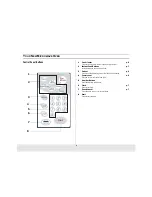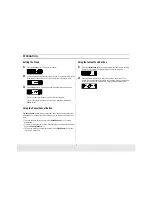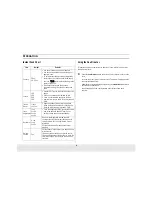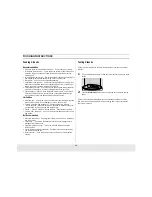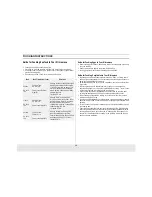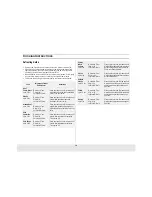
17
A
PPENDIX
Troubleshooting Guide
Before you call a repair person for your oven, check this list of possible
problems and solutions.
Neither the oven’s display nor the oven operate.
• Properly insert the plug into a grounded outlet.
• If the outlet is controlled by a wall switch, make sure the wall switch is turned
on.
• Remove the plug from the outlet, wait ten seconds, then plug it in again.
• Reset the circuit breaker or replace any blown fuse.
• Plug another appliance into the outlet; if the other appliance doesn’t work,
have a qualified electrician repair the outlet.
• Plug the oven into a different outlet.
The oven’s display works, but the power won’t come on.
• Make sure the door is closed securely.
• Check to see if packing material or other material is stuck to the door seal.
• Check for door damage.
• Press Cancel twice and re-enter all cooking instructions.
The power goes off before the set time has elapsed.
• If there has not been a power outage, remove the plug from the outlet, wait
ten seconds, then plug it in again. If there was a power outage, the time
indicator will display “
“.
Reset the clock and any cooking instructions.
• Reset the circuit breaker or replace any blown fuse.
The food is cooking too slowly.
• Make sure the oven is on its own 10 amp circuit line. Operating another
appliance on the same circuit can cause a voltage drop. If necessary, move
the oven to its own circuit.
You see sparks or arcing.
• Remove any metallic utensils, cookware, or metal ties. If using foil, use only
narrow strips and allow at least one inch between the foil and interior oven
walls.
The turntable makes noises or sticks.
• Clean the turntable, roller ring and oven floor.
• Make sure the turntable and roller ring are positioned correctly.
Using your microwave causes TV or radio interference.
• This is similar to the interference caused by other small appliances, such as
hair dryers. Move your microwave further away from other appliances, like
your TV or radio.
Care and Cleaning
Follow these instructions to clean and care for your oven.
• Keep the inside of the oven clean. Food particles and spilled liquids can stick
to the oven walls, causing the oven to work less efficiently.
• Wipe up spills immediately. Use a damp cloth and mild soap. Do not use harsh
detergents or abrasives.
• To help loosen baked on food particles or liquids, heat two cups of water (add
the juice of one lemon if you desire to keep the oven fresh) in a four-cup
measuring glass at High power for five minutes or until boiling. Let stand in the
oven for one or two minutes.
• Remove the glass tray from the oven when cleaning the oven or tray. To
prevent the tray from breaking, handle it carefully and do not put it in water
immediately after cooking. Wash the tray carefully in warm sudsy water or in
the dishwasher.
• Clean the outside surface of the oven with soap and a damp cloth. Dry with a
soft cloth. To prevent damage to the operating parts of the oven, don’t let
water seep into the openings.
• Wash the door window with very mild soap and water. Be sure to use a soft
cloth to avoid scratching.
• If steam accumulates inside or outside the oven door, wipe with a soft cloth.
Steam can accumulate when operating the oven in high humidity and in no
way indicates microwave leakage.
• Never operate the oven without food in it; this can damage the magnetron
tube or glass tray. You may wish to leave a cup of water in the oven when it is
not in use to prevent damage if the oven is accidentally turned on.




